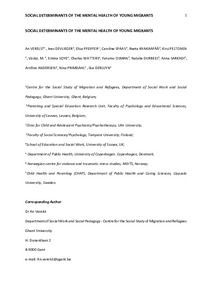Social Determinants of the Mental Health of Young Migrants
Verelst, An; Spaas, Caroline; Pfeiffer, Elisa; Devlieger, Ines; Kankaanpää, Reeta; Peltonen, Kirsi; Vänskä, Mervi; Soye, Emma; Watters, Charles; Osman, Fatumo; Durbeej, Natalie; Sarkadi, Anna; Andersen, Arnfinn; Primdahl, Nina Langer; Derluyn, Ilse (2022-01)
Verelst, An
Spaas, Caroline
Pfeiffer, Elisa
Devlieger, Ines
Kankaanpää, Reeta
Peltonen, Kirsi
Vänskä, Mervi
Soye, Emma
Watters, Charles
Osman, Fatumo
Durbeej, Natalie
Sarkadi, Anna
Andersen, Arnfinn
Primdahl, Nina Langer
Derluyn, Ilse
01 / 2022
This publication is copyrighted. You may download, display and print it for Your own personal use. Commercial use is prohibited
Julkaisun pysyvä osoite on
https://urn.fi/URN:NBN:fi:tuni-202302162450
https://urn.fi/URN:NBN:fi:tuni-202302162450
Kuvaus
Peer reviewed
Tiivistelmä
Background: Young migrants face particular risks to develop mental health problems. Discrimination and social support impact mental health, yet little is known about the differential impact thereof on mental health in newcomers, non-newcomer migrants, and nonmigrants. Aim: This study sheds light on mental health (posttraumatic stress, behavioral problems, hyperactivity, emotional distress, peer relationship problems, prosocial behavior) and the overall well-being of newcomers, non-newcomer migrants, and non-migrants. Furthermore, the impact of social support and discrimination on mental health is investigated. Method: Descriptive analysis and Structural Equation Modelling (SEM) were applied to analyze responses of 2,320 adolescents through self-report questionnaires in Finland, Sweden, and the UK. Results: Newcomers, non-newcomer migrants, and non-migrants have different psychological profiles. While newcomers suffer more from posttraumatic stress disorder (PTSD) and peer problems, non-newcomers and non-migrants report more hyperactivity. Discrimination strongly threatens all mental health dimensions, while support from family serves as a protective factor. Support from friends has a positive impact on PTSD among newcomers. Limitations: As this study has a cross-sectional design, conclusions about causality cannot be drawn. In addition, history of traumatic life events or migration trajectory was lacking, while it may impact mental health. Conclusion: Different mental health profiles of newcomers, non-newcomer migrants, and non-migrants point to the need for a tailored and diversified approach. Discrimination remains a risk factor for mental health, while family support is a protective factor for adolescents. Interventions that foster social support from friends would be especially beneficial for newcomers.
Kokoelmat
- TUNICRIS-julkaisut [16983]
